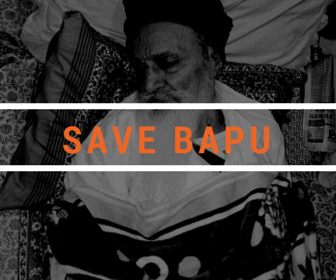Family of Hunger-Striker Surat Singh Khalsa to Rally in His Honor at California State Capitol
Sacramento, CA: May 17, 2015 – South Asian diaspora plan to rally for Surat Singh Khalsa, a permanent resident of California on hunger-strike in India since January 16, at the West Steps of the California State Capitol Building at 3:30pm on Friday, May 22. [Click here to RSVP on Facebook.]
Khalsa, who entered the 121st day of his hunger strike on Saturday, is protesting the continued imprisonment of Sikh political dissidents in India who have served their court-appointed sentences but are denied release. Three of Khalsa’s daughters, who affectionately call him “Bapuji” (honored father), are expected to attend next Friday’s rally in Sacramento, CA. Members of the State Legislature, which last month passed a resolution recognizing the 1984 Sikh Genocide, are invited to stand in solidarity with the family.
Mandeep Kaur Dhillon, one of Khalsa’s five daughters, will speak at the rally. Dhillon says, “My father didn’t tell me how to live; he lived, and let me watch him do it. I support my father every step of the way. He is a trooper. I have great, great, great respect for him.”

Khalsa (right) with his son Gogi (center) and daughter Sarvrinder (left) on the 121st day of his hunger-strike.
Khalsa fled religious and political persecution in India in 1988 to settle in California not far from Stockton Gurdwara, the oldest Sikh-American institution in the United States. “The California State Legislature voted to recognize the state-sponsored 1984 Sikh Genocide on the floor of both houses this past month because of the historic significance this travesty has for the Sikh community and other Indian minorities,” remarks Organization for Minorities of India (OFMI) Founding Director Bhajan Singh.
Singh explains: “The genocide is a major cause of the influx of Sikh immigration the United States, yet today, three decades after the atrocity and after others like the 2002 Gujarat Genocide followed in its wake, victims of genocide are still suffering unjustly as political prisoners in Indian jails. Bapu Surat Singh Khalsa, aghast at the continued torture of these prisoners, traveled to Punjab to begin a hunger-strike protest to seek the release of these political prisoners who are held long past their politically-based prison sentences.”
Assembly Concurrent Resolution 34, passed by California’s State Assembly on April 16 and State Senate on April 30, marks “the 30 year anniversary of the horrific anti-Sikh pogroms, which claimed the lives of thousands of Sikhs throughout India.” Commenting on its passage, Senator Jim Nielsen stated: “Indian officials and police officers led the way in the rape, torture, and murder of thousands of Sikhs just a few miles from the prime minister’s residence. Even today, Christians, Muslims, Dalits, and Sikhs are at risk. The time has come for the Indian government to admit its culpability and make a commitment to protect all of India’s minority communities.”
Urging support for Khalsa’s hunger-strike, Bhajan Singh comments: “As respecting basic human rights is the most essential role of any democratic government, it is more important than ever that policymakers and community leaders work together to protect these most basic rights.”

Gogi in police custody in Punjab, pictured with the officer on left who tortured him in custody (he was released April 27).
OFMI has stood with Khalsa and his family in the United States since early March after learning that his son, an American citizen, was unjustly detained in Ludhiana, Punjab for visiting his ailing father. “We’d heard that Bapuji was forcibly hospitalized in early February, but then we discovered, by accident while interviewing a journalist who was arrested for covering the situation, that a U.S. citizen was also jailed,” says Pieter Friedrich, an advisor to the US-based human rights group. “Ravinderjit Singh Gogi, the son of Khalsa, was ministering to his father when police descended on the hospital where Khalsa was held, seized Gogi, and tossed him in a dungeon.”
After Khalsa’s family hosted a press conference in cooperation with OFMI, and then the influential West Sacramento Gurdwara caught the attention of local CBS news while praying for Gogi’s and Khalsa’s safety, seven California congressional representatives finally joined an April 15 letter on their behalf. The two were finally released from police custody — Khalsa on April 23 and Gogi on April 27. “Bapu Surat Singh Khalsa and his son Ravinder were arrested and detained under deplorable conditions,” says Bhajan Singh. “Bapu was detained in a civil hospital and force-fed, while his son Ravinder was beaten in an Indian jail while being denied due process.”
Khalsa, who never ended his hunger-strike but was force-fed for 56 days, has now been without sustenance for over three weeks. Reporting from Punjab, his daughter Sarvrinder Kaur says Khalsa has lost the ability to either walk or talk, but insists he will continue his hunger-strike until all political prisoners are freed. In California, his daughter Devinderdeep Kaur Sran joined activists this past week in approaching congressional offices to ask them to speak in recognition of her father’s struggle.



